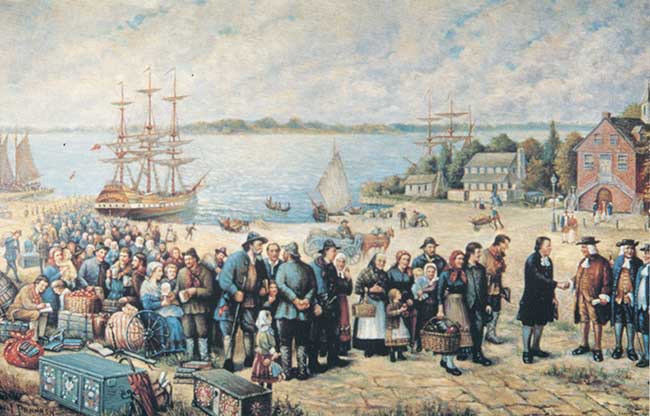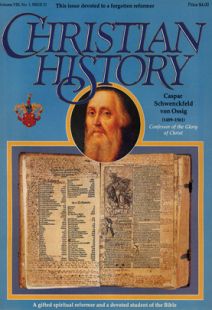The Landing of the Schwenckfelders from the St. Andrew

A PAINTING by artist Adolph Pannash, which hangs in the Schwenckfelder Library in Pennsburge, PA, was painted in 1934 for the bicentennial of the Schwenckfelders’ arrival.
The scene has been quaintly idealized by the artist. These newly arrived Schwenckfelders look tidy, cheerful, and well-costumed; the real people probably would have appeared less than neat and refreshed. The journey was frightening, and nine persons died during the trip (see The Hard Journey to America). The Quakers who are greeting them here all look like the smiling man on the oatmeal box.
Nevertheless, the scene contains much truth, and is intended justly to glorify the event. The persecuted Schwenckfelders, who brought their gaily decorated wooden chests filled with their belongings, and their beloved books, were welcomed in Pennsylvania by the Quakers—themselves well acquainted with intolerance and persecution.
Two days after their arrival, on September 24, Pastor George Weiss led them in a gathering to give thanks to God for their safe passage and for His deliverance and mercy in providing them with a new home. The meal they held on this day, their thanksgiving meal, is still observed and celebrated each year by Schwenckfelders on September 24th, their Day of Remembrance.
NOTE: Though George Washington declared November 26th as Thanksgiving Day, the national holiday was not regularly observed in America util 1863, when Abraham Lincoln made it a formal holiday to be observed on the last Thursday in November. In 1941, Franklin D. Roosevelt changed it to the third Thursday in November.
Possibly the oldest continuously observed day of Thanksgiving in America is the Schwenkfelders’ Day of Remembrance.
The following is early American Schwenkfelder folk art
Translation of “My Heart”
My heart meditates on the good Word
Your work that King Christ give
Like a feather my tongue will be
for his Holy Ghost
The most beautiful of all people
are you, noble King Jesus Christ
Grace proceeds from your mouth
even as God has blessed you
The sword of the spirit on your side
gloriously triumphs in the battle
Thus as it shows in the Word of Truth
[it] gains eternal victory and honor*
* translation by Hans Huijsing
By the Editors
[Christian History originally published this article in Christian History Issue #21 in 1989]
Next articles
From the Archives: Waldensian Legend Concerning the Donation of Constantine to Pope Sylvester (date unknown)
This early document tells in a remarkable and fanciful form the Waldensian story of how the Church had come to compromise with the world. Though The Poor were not around until the 12th century, mention is here made of their presence in the 4th century. They could, however, claim solidarity with ancient Christians who rejected worldly wealth and power.
Remembered by Their Enemies
Most of what we know about the early Waldensians comes from the reports of those who wanted to accuse and eliminate them.
the EditorsFrom the Archives: A Barba of San Martino (1451)
This is an excerpt from a written account of the heresy trial of Filippo Regis. Waldensians were routinely questioned about their knowledge of the elusive barba—the itinerant Waldensian spiritual leaders. Such accounts are often distorted: it is unlikely a barba would have taught to deny the virgin birth, or to deny that “the sons” could perform miracles.
the EditorsSupport us
Christian History Institute (CHI) is a non-profit Pennsylvania corporation founded in 1982. Your donations support the continuation of this ministry
Donate



